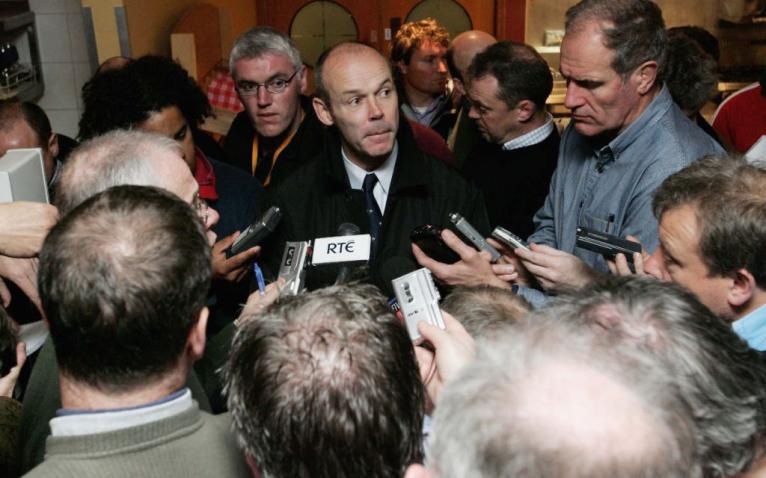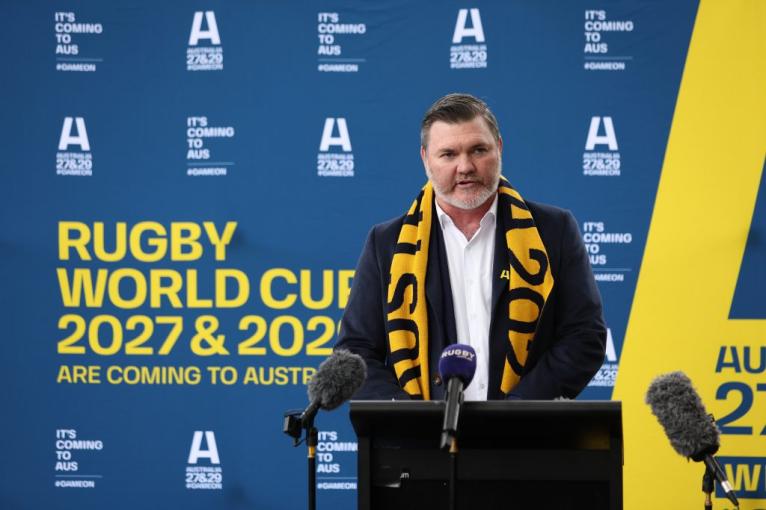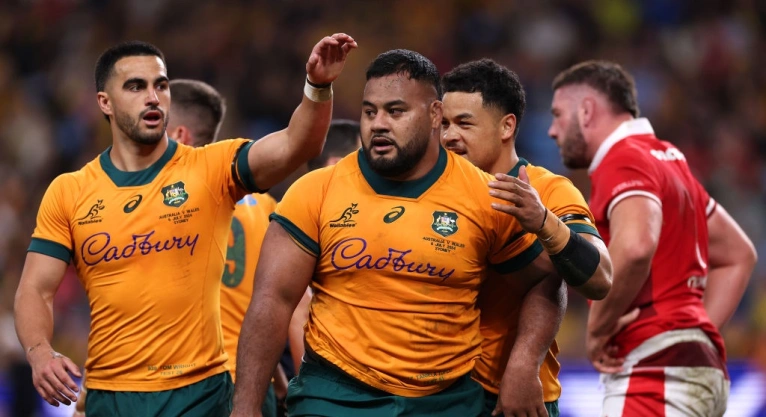“Now it’s our turn.” Those were the famous words of Keith Barwell, the local businessman who took over Northampton Saints on the bridge between amateur and professional eras in 1995. The comment was made after England had won their one and only Rugby World Cup in 2003, and it described eloquently the bitter war which preceded it.
For one nostalgic World Cup cycle between 2000 and 2003, England head coach Clive Woodward got everything he wanted, and the right platform to succeed via the Elite Playing Squad agreement. For Woodward, that agreement was merely a basis for the introduction of union-owned central contracts further down the line. For the Premiership owners, it was time for the clubs to stake their own claim.

And why not? Barwell and co had been the ones to invest in the club game when the RFU had opted out in 1995, and they introduced modern business and marketing methods when they were most needed. Only 12 calendar months on from England’s greatest triumph, Woodward had resigned and the clubs had won the war. As the clubs rose again, so the national team fell further than it had risen in the years 2000-2003, with the win rate between 2004 and 2008 dwindling to a miserable 45%.
The struggle for primacy between the international and club game is still the besetting conundrum of rugby’s professional era. Historically the pyramid has always tapered towards a pinnacle in the international game in the southern hemisphere and in Ireland. In England, France and Wales the picture has been very different, with private ownership promoting the club scene ahead of all else. France have never won a World Cup, but it has generated the most successful club format in rugby’s 30-year professional lifetime.
France will not send its top 20 players to New Zealand for the Test series this July because of club commitments which ride shotgun with a 10-month Top 14 season. That is just the most visible face of the problem. Elsewhere, the war has been driven underground towards player recruitment at teenage level.
One of the pillar nations supporting the international vision of the game recently drew attention to the poaching of Australian teenagers by French clubs. As Rugby Australia chairman Dan Herbert commented last week:

“It’s something we’re talking to World Rugby about. Our view is France has the ability to produce its own players. They don’t need to come and talk to our player agents to try and poach ours at a very young age.
“There’s going to be some discussions at World Rugby level around what is actually allowed to happen in that market. There has to be a coming together on what is allowed and what isn’t allowed.
“It’s the French clubs, it’s not the French federation. They’re working directly with player agents here.
“We don’t do it. Most other countries don’t do it. It’s something we’ll take up with World Rugby.”
Massive 6ft 8ins, 147kg 16-year-old Visesio Kite was snapped up by La Rochelle after representing Queensland. Other hot properties from the same Aussie under 16s team as Kite, such as Adrian de Klerk [Montpellier] and Declan Minto [Bayonne] are either on the Top 14 radar or have been signed, sealed and are awaiting delivery.
U18s back-row sensation Heinz Lemoto [Toulouse] is the subject of a tug of war between European giants Toulouse and the NRL’s Penrith Panthers. ‘Poaching’ at that tender age means all four will have ample time to acclimatise to French rugby culture, and will become eligible to represent the national team in their early twenties, having fulfilled the five-year residency qualification in a club academy. As soon as World Rugby plug one hole in the dyke, the clubs find a workaround.
Under WR’s young players protocol, ‘the unauthorised approach to, and/or ‘poaching’ of young players between unions’ is prohibited. The regulations urge host unions to ‘impose appropriate sanctions’ on those who contravene the rule.

But what can World Rugby do? It could impose sanctions on the Fédération Française de Rugby, but the body which runs the Top 14 and the ProD2, the Ligue Nationale de Rugby, is entirely independent. With two fully professional leagues, arguably the LNR is doing more to provide employment opportunities, and grow the game than any other professional entity globally. Only this season, the Top 14 overtook soccer’s Ligue 1 in terms of broadcasting appeal.
The player drain from Australia to France shows no sign of slowing down in the senior game either. Brumbies full-back Tom Wright is also being slowly pulled in by the Top 14 tractor-beam [Montpellier] when his current deal at home expires at the end of 2025. Rob Leota will be the fourth New South Wales loose forward to pack his bags and head to France at the end of the current Super Rugby season, following in the footsteps of Langi Gleeson, Ned Hanigan and Lachie Swinton.
Leota and prop Taniela Tupou have been on the radar of Top 14 teams for many a moon. The Top 14 would fit Tupou to a tee – 140kg-plus tight-heads who can play in sharp spurts are not just wishful thinking in France, they are de rigeur for every club with any ambition.
If there is a light at the end of an increasingly dark tunnel, it may come in the form of limited sabbaticals and exchange schemes with ‘preferred clubs’. Outstanding centre Len Ikitau is set to join that long-time home for Aussie rugby talent, Exeter Chiefs in Devon, on a nine-month deal. Ikitau will receive excellent support at the club while pocketing a cool £400K for his efforts and remaining eligible for the 2027 World Cup.
Jordie Barrett has been an unqualified success during his six-month sabbatical at Leinster and will now be followed to the province by fellow All Black Rieko Ioane. Leinster for New Zealanders, like Exeter for Australians, represents a win-win situation for both parties. Both clubs are fast becoming ‘trusted destinations’ or safe havens where players are guaranteed to improve – but their return home is likewise written in stone. As ex-All Black Israel Dagg observed:
“Jordie Barrett would have had multiple offers, offers which probably would have dwarfed that offer from Leinster. I’m saying I know, because I do know. His decision was actually to turn down the money. Maybe [Rieko] just saw what Jordie was able to do and it inspired him. Jordie’s game has developed so much.”
One player who could make the sabbatical principle work for the Wallabies with immediate effect is hybrid first five-eighth/centre James O’Connor, who currently plies his trade with the Crusaders on a one-year deal.
‘JOC’ has a specialist role to fill within the Crusaders, as a veteran mentor and finisher in the final quarter of games which have usually started with the Canterbury young gun Taha Kemara in the 10 jersey. Over the first 10 rounds of Super Rugby Pacific he only averages 26 minutes per game, but he kicked the winning goal in a titanic, rain-soaked tussle with the Blues last weekend.
The revival in the 34-year-old Queenslander’s fortunes has not gone unnoticed. On Stan Sport’s Between Two Posts podcast, he was mentioned in Lions dispatches by ex-Wallaby Morgan Turinui:
“James O’Connor has gone from being asked whether he’d be interested in corporate hospitality gigs during the Lions series to high-performance, high-echelon people in Australian rugby considering him in the broader squad.
“I’m not talking about starting XV but this is in camp with the Wallabies for a month preparing to win a Lions series, it’s a useful guy to have there that knows the pitfalls of what happened 12 years ago.”
O’Connor would be able to provide a trustworthy – again, that word – hand on the rudder in the last 20 minutes of games, and with his experience at all positions in the backline bar nine, he could encourage Australia to move towards a 6-2 bench split against the tourists.
No game illustrated the impact of O’Connor’s arrival on the field better than the round five encounter with his old club, the Western Force. When JOC trotted on with half an hour remaining, the Crusaders were only 27-21 ahead. Within 10 minutes the red and black had scored the next three tries and 21 points to put themselves well out of reach.
JOC was highly instrumental in all aspects of triple threat – kick, run and pass – in that key period. He began with an opportunistic territorial force-back penalty upon his arrival; then followed it immediately with another dead-eye punt, bang on the 5m line.
The try-scoring probability drops by almost 20% when the kick does not reach the 5m line, and the Crusaders were suitably energised by the Australian’s accuracy from the boot.
The ball from the front is behind O’Connor, but he still manages to regenerate momentum with a double pump which creates another try for Macca Springer out on the left, one of five scored by the number 11 on the day.
Everything JOC did imparted energy and impetus when it really mattered, including two successful conversions from wide out on the left touchline.
Those who believe the legs of a 34.year-old can no longer threaten the defensive line were forced to reconsider.
Even in the twilight of his professional career, the one-time wunderkind of Australian rugby is still playing flat to the gain-line and forcing a one-on-one tackle from a tight forward least able to make it [Nic Dolly in the white hat].
Barrett, Ikitau and now Ioane have shown the way forward. Short-term sabbaticals and exchange schemes with trusted partners in the northern hemisphere allow players to create new interest in their careers, pocket some cash and still return home in time for the World Cup.
In an era when the club game still threatens to undermine the national pyramid schemes south of the equator, that could be a vital development. The idea of once-proud Australia becoming a feeder system to the Top 14 will not be palatable to many outside France.
In the meantime, Australia can gain concrete benefit from one of their own ‘on sabbatical’ in the South Island of New Zealand. The best years of James O’Connor may be behind him, but there could still be an opportunity to mentor young Wallabies and finish matches against the Lions.
“I am very aware the other guys have got the nod first, but I’m just putting that question out there,” he said on a recent GBRANZ podcast. “If I’m playing well enough and I’m doing a job, why can’t I be in the question still?”
Why not indeed?


Ahh, I see you’re/alterative title when viewing you’re articles in list, far more accurate and informative to the discussion!
Yes, sabbaticals are an answer. You can even view French players being rested from club and country alternatively as ‘sabbaticals’. Like this idea of Jordie taking a rest during the 6N (were some weeks there was still footy right?) was a sabbatical from his sabbatical lol
But yes, idea’s like introduced in the article widen and enhance the mean for a lot of nations. It really is the most hotly contested and shared sport on the world, and sabbaticals are just one strange way to try and make it work, make the sport succesful.
“Only this season, the Top 14 overtook soccer’s Ligue 1 in terms of broadcasting appeal.”
What was your metric on this point Nick, coz that’s a pretty seismic milestone for rugby!
Haha owned!
Did the article say that? I thought rugby was pretty popular in France compared to football (and that that didn’t end too long ago, lke this century)?
You’ll have to look it up JW!
Lol you need to shoot your editor for that headline, even I near skipped the article.
France simply need to go to a league format for the Brennus, that will shave two weekends of pointless knockout rugby from their season and raise the competitions standards and mystique no end.
The under age loophole is also a easy door to shut, just remove the lower age limit. WR simply never envisioned a day were teams would target people under the age of 17 or whatever it is now, but much like with Rassie and his use of subs bench, that day was obviously always going to come. I can’t remember how football does it, I think it’s the other way around with them, you can’t sign anyone younger than that but unions can’t stop 17 or 18 yo’s from leaving for a pro club if they want to. There is a transaction that takes place of a few hundred thousand for a normal average player. I’d prefer rugby to be stricter and just keep the union bodies signoff being required.
What really was their problem with Kite and co leaving though? Do we really need a game dominated by the International format? I even think WR’s proposed calendar might be a bit too much, with at minimum 12 top tier games being played in the World Championship. I think 10 to 12, maybe any one player playing 10 of those 12 is the best way to think of it, for every international team is max, so that they can allow their domestic comps to shine if they want, and other nations like Japan and Fiji can, even some of the home nations maybe, can fill out their calendar with extra international tours if they like them as a way to make money. As it is RA don’t have as good a pathway system, so they could simply buy back those players if they turn good. Are they worried they’ll be less likely to? We wait for baited breath for the new season to be laid out in front of us by WR.
It’s not independent at all. The LNR is a body under, and commissioned by, the FFR (and Government control) to mediate the clubs. FFR can simply install a new club competition if they don’t listen, then you’d see whether the players want to stay at any club who doesn’t tow the line and move to the new competition, as they obviously wouldn’t fall under the auspice of world rugby. They would be rebels, which is fine in and upon itself, but they would isolate themselves from the rest of the game and would need to be OK with that. I have no doubt whatsoever that clubs would have to and want to fall in line to remain part of the EPCR and French rugby. Probably even the last thing they would want is to compete with another French domestic competition that has all the advantages they don’t.
All those players would do good for a few seasons in France, especially the fringe ones, with thankfully zero risk of them being poached if they turn good. New Zealand had a turn at keeping all of it’s talent, and while it upticked the competitiveness of the Super Rugby teams into a total dominance of Australian and South African counterparts (who were suffering more heavily than most the other way at that stage), it didn’t have as positive an effect on the next step up as well as ensuring young talents development is not hindered/blocked does. Essentially NZR flooded the locate market with players but inevitably it didn’t think the local economy could sustain any more pro teams itself, so now we are seeing a normal amount of exodus for the availability of places again. Are Australia in exactly the same footing? I think so, finances where dicey for a while perhaps but I doubt they are putting money constraints on their contracting now. It’s purely about who leaves to open up opportunity.
The LNR operates independently of the FFR, which is why the two parties had to negotiate re: the players able to represent France in NZ in July https://www.ultimaterugby.com/news/new-agreement-between-ffr-and-lnr-and-potential-%22france-development%22-match/657556
Thanks Nick. I’ve been happy about Len signing a deal which sees him return home, but I didn't realise how bad Exeter were going!
Herbert and Waugh have obviously supported this deal and have brought back Matt Phillip next year. It seems we might need some more of those deals as there are few heading overseas
When he arrives he’ll find a club in crisis sadly DW.
JOC for a good while struggled with not being able to sprint flat out, he’s recently said he’s faster than ever or something similar. I doubt that but I’d take it that he’s fit and can hit top speed. Seeing the work he’s doing at the Crusaders with the young 10s and he’s a much loved player in a short time. Seems like a good idea to have him in the Wallabies squad for sure.
I don’t think he has top-end speed, but he’s squat and can change direction easily - good guy for beating defenders and setting it up for others to finish!
hhfhf
I’d like to see JOC in the squad but I think Noah Lolesio and Tommy Lynagh (who was terrific against the Blues on Friday night) will be 1st choice flyhalves. I said on Brett’s article that I can see JOC doing a Morne Steyn and kicking a series clinching penalty. Thst’s what my crystal ball is saying anyway.
Will be fascinating to see if Joe sees a place for his experience. Neither of the two you mention have been real consistent this season.